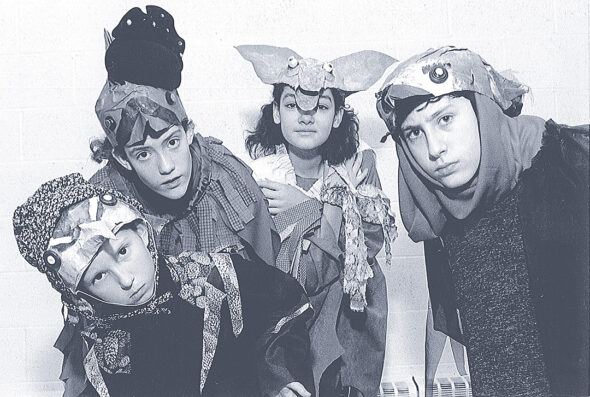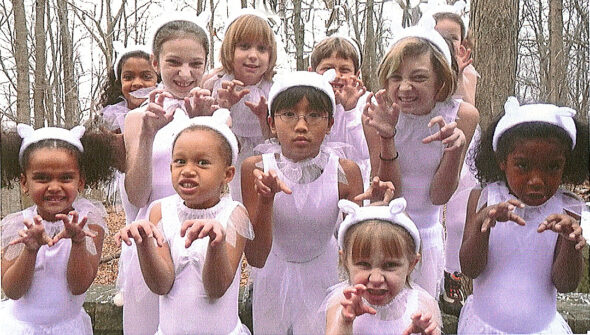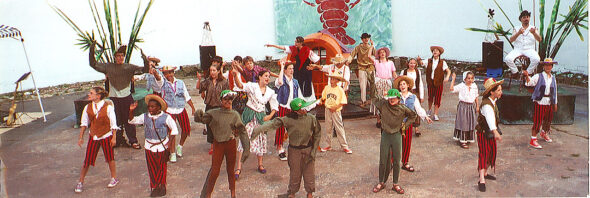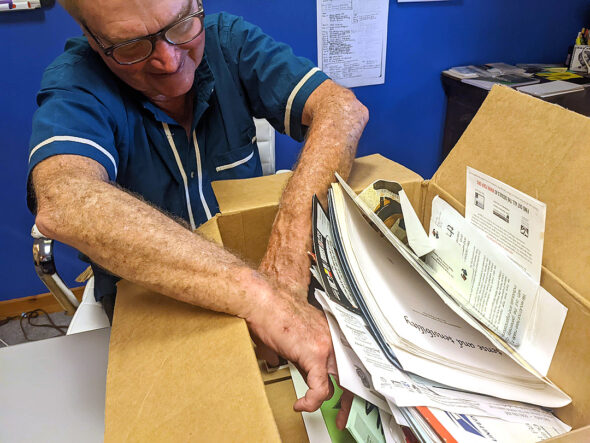
Characters from YSKP's “When Birds Could Talk and Bats Could Sing,” adapted from a book by Virginia Hamilton, 1997 (YSKP archives)
Yellow Springs Kids Playhouse to take final bow
- Published: August 26, 2022
After 27 years, the curtains are closing on one of the village’s longest-running and most beloved theater companies.
Earlier this month, the Yellow Springs Kids Playhouse announced via its Facebook page that the youth theater company is dissolving. The YSKP will take its final bow at the “It’s a Wrap” Gala on Saturday, Oct. 1, 7–10 p.m., at the Foundry Theater.
The gala will not only serve as a way for the community — and the company’s many alumni — to bid YSKP “farewell,” but also as a fundraiser for the to-be-established YSKP Endowed Legacy Scholarship. The scholarship, according to a press release, will provide $700 each year to a YSHS graduate who is “interested in pursuing advanced education and training in art and innovation-related practices.”
In interviews with the News over the last two weeks, YSKP’s longtime director and founder John Fleming and board member Roger Beal spoke on the decision to shutter the program. As was the case for many performance groups, they said, the ongoing pandemic threw a wrench into any future plans for the company.
“The performing arts stopped literally for at least a year, maybe a year and a half,” Fleming said. “Subsequent to that, in consultation with [Beal], it seemed like we had reached the end of our epoch.”
By 2019, YSKP could no longer perform in the Miles Budd Goodman Amphitheater at Antioch College, as the outdoor performance space showed structural damage. With the onset of the pandemic, YSKP also lost access to the Foundry Theater, which it had used for rehearsal, class, work, storage and indoor performance space for most of its run.
Beal added that YSKP often functioned as a kind of summer camp for the young people who returned to its shows each year. As more and more summer enrichment options became available to village youth over the years, however, it became harder for kids to commit to rehearsals, he said.
“We kept seeing the same kids every year, and we had a really good group — but kids have too many things to do in the summer,” Beal said.
Fleming went on to say that there are a “bunch of things” that went into the decision to close YSKP, but that he believes its legacy will live on in other creative avenues in the village.
“There will always be really talented kids here who want to do theater, and I think that there will always be adult artists who want to work with them,” he said.

“The New Bremen Town Musicians,” 2011. (YSKP archives)
The ‘Big Idea’
The story of YSKP really begins with the story of Fleming. The first pages of his own theatrical history were written when he began studying mime in Boston and Paris, and subsequently formed a mime troupe, Kissko-Pop, in the late ’70s with two friends.
“We went to visit my parents in New Orleans, where I’m from, en route to San Francisco — a big mime town,” he said. “And we kind of hit it in New Orleans, so we stayed there.”
The troupe performed outdoors in Jackson Square in the city’s French Quarter and, later, in the then-up-and-coming Contemporary Arts Center. Kissko-Pop’s most ardent audiences, Fleming said, were often children, whether they were performing in schools or in the street.
“When you’re doing mime, there tends to be a young person not too far away,” he said.
Several years into Kissko-Pop’s career, Fleming said, change came floating down the Mississippi River.
The Otrabanda Company, a performance group that had been founded at Antioch College, would perform its “River Raft Revue” each summer. Traveling by raft down the Mississippi from St. Louis, Mo., Otrabanda would take its show to rural towns and cities along the way, stopping in New Orleans.
“That’s when I met Louise,” Fleming said, referring to his partner, Louise Smith. “At that point, the two companies more or less merged.”
Fleming spent several more years with Otrabanda and the “River Raft Revue,” performing Moliere and mime, among many other things, under a circus tent for riverside audiences.
In 1994, Fleming made his way to Yellow Springs by way of New York City, where he had worked in children’s theater. He and Smith came to the village with their two children, Emile and Belle-Pilar, and Smith began teaching theater at Antioch College, her alma mater. After years of traveling and performing, Fleming looked out into the vista of small-town life in the village — and noticed a lack of theater for young people outside of school.
“And then it was kind of like, ‘What am I gonna do?’” he said. “I had been working with youth in different places. So we did our first show the next summer.”
That first YSKP production was “Dick Tracy: The Musical,” in 1995, with a script by George Sand (the Midwestern contemporary playwright, not the 19th-century French writer). Fleming directed and choreographed the show, with music by Ellen Haag and visual design by local artist Migiwa Orimo.
That first show became something of a playbook for the way YSKP’s productions would form from the ground up every year — and every new season of YSKP began the same way.
“The way YSKP worked was there was always the ‘Big Idea,’” Fleming said.
Those big ideas became the locus around which Fleming or a commissioned playwright would form a story, and those stories were always centered on what would be relevant to the world in which the young actors were living.

“Gaston Boudreaux: The Cajun Robin Hood,” 2002 (YSKP archives)
As Fleming wrote in the 2010 educational resource text, “The Yellow Springs Kids Playhouse Handbook for Theaters, Communities and Teachers”: “Our productions speak to participants about what it means to be growing up at just that moment. … The spine of each production is a window into the world of youth — their dreams, edges, embraces and rejections.”
YSKP was something of a singular company in that it produced and performed only original plays and musicals, written exclusively for YSKP. Every year, YSKP’s young cast would star in either a world premiere or a revival of a show that had originally debuted with the company — a practice uncommon not only for children’s theater, but for community theater in general.
“It’s almost unheard of, even for the big theaters like Minneapolis Children’s Theater,” Fleming said, adding that plays were commissioned from both established and emerging writers.
Though the nearly 30 shows YSKP produced in its time were for young actors, the big ideas around which they were centered didn’t shy away from deep meditations on the world. There was 2005’s “Little Boy,” which told the story of the bombing of Hiroshima in Japan through puppetry and choreography. In 2007, “$ense and $ensibility” adapted the classic Jane Austen novel into a coming-of-age conversation between 19th-century England; Santiago, Chile; and Yellow Springs.
And 2002’s “Gaston Boudreaux: The Cajun Robin Hood,” which was revived in 2013, focused on ecological change.
“[In that show,] the saltwater was encroaching on the freshwater bayous and disturbing the life of Cajun people,” Fleming said. “It wasn’t like we predicted that, but that’s actually what’s happening right now.”
Fleming said YSKP’s propensity to have the themes of its shows dig deep was a matter of taking its young actors seriously; as he wrote in YSKP’s “Handbook,” young people aren’t afraid of “big ideas or serious themes.”
“It wasn’t necessarily about being cute,” Fleming said. “One thing I feel is true of YSKP is that we treated kids as people.”
And they were treated as serious actors; because YSKP’s shows were original to the company, young actors had the unique challenge of often originating a role that no one else had ever played, or at least, played in that particular way — there were, as Fleming said, often no “prototypes” for them to mirror.
At the same time, their work was bolstered by professional-level contributions from artists like Migiwa Orimo and Pierre Nagley, who provided set design and artistic direction; musicians like Tucki Bailey, Mark Laurens and the late Carl Schumacher; and scripts from Fleming and other playwrights. Much of YSKP’s funding over the years came from state and federal grants, allowing the productions to maintain a high quality.
Importantly, every young actor who auditioned for a YSKP show was given a role. This often mean large choruses in each show, but as Fleming wrote in the YSKP “Handbook,” the chorus often “stole the show.” In 2007, the chorus of pigeons from “$ense and $ensibility” was named “Best Ensemble in a Musical” by the Dayton Daily News, lending credence — and a bit of a double meaning — to the oft-quoted Stanislavski adage: “There are no small parts, only small actors.”
All of this combined to create an experience, Fleming said, that taught kids to continue to take themselves, and their work, seriously, both in childhood and as they grew into adults.
“It’s a whole generation of young actors, some of whom — like Martin Bakari, Michael Malarkey, Allison Kelly — became professionals in the theater world or on television,” Fleming said. “And a great many others just became successful.”
Transitions
In 2014, Fleming decided to retire from YSKP after that year’s show, “Superhuman Happiness,” with the intention of focusing on other creative ideas and his work in the theater program at Central State University, where he is still an instructor.
As he told the News at the time: “Twenty years seems like a good amount of time. Didn’t Thomas Jefferson say there should be a revolution every 20 years?”
Fleming handed the reins to then-villager and YSKP alumna Ara Beal, who directed “The Farm,” “Alice, Although” and “Luminous Luna” from 2015 to 2017. In 2018, Ara Beal left YSKP for another job, and no shows were produced that year, but Fleming returned to the directorial chair the following summer — YSKP’s 25th anniversary — for a revival of one of YSKP’s most popular shows, “Bonanza Valley!”

YSKP founder and longtime creative director John Fleming sifted through archival materials from the youth theater company’s 27-year history during an interview with the YS News. (Photo by Lauren “Chuck” Shows)
Later that year, the loss of the Foundry Theater and amphitheater as performance spaces meant Fleming was looking for alternative avenues through which YSKP could perform. An answer came when, as Fleming told the News in 2021, villager Bob Swaney pitched the idea of a small, mobile theater. With funding from Swaney and his wife, Sue, and the wider community, the YSKP Traveling Tabletop Theater, or TTT, was born.
Incorporating puppets on a small stage and seating for small audiences, Fleming said at the time that the intention of the TTT would be to “include, and impact, youth across the Miami Valley region” with annual performances. This week, he added that the impulse was similar to his work with the “River Raft Revue,” which he said youth on the company’s stops along the Mississippi looked forward to every year.
The world the TTT was born into, however, was one in which the pandemic made live performances of any kind difficult. The first — and ultimately final — production of the TTT was “The King Stag,” which was ultimately produced as a video performance and reached audiences via Channel 5 and YouTube.
In 2021, YSKP’s TTT held auditions for what would have been that fall’s show, “The Time Machine.” Combining puppetry with live acting from a script developed by Fleming from the H.G. Wells novel of the same name, “The Time Machine” began production, but stalled before it could be performed.
“We started working on it, but it just became overwhelming,” Fleming said. “The script is all ready to go, but it combining live actors with puppets — that’s kind of hard.”
He added, with a laugh: “I’m not the first director to be taken down by a puppet.”
Fleming said many of YSKP’s historical documents, including photos, newsletters, playbills, scripts and DVD recordings from productions, will be archived at the Greene County Room at the Xenia branch of the Greene County Public Library.
Fleming brought some of YSKP’s soon-to-be-archives to the News office in a plain cardboard box for the edification of this reporter. He plunged his hands into the box, sifting through memories almost three decades deep, pulling out evocations of his long career.
“Here’s a photo from ‘Gaston Boudreaux,’ he said. “You can’t go wrong with dancing alligators! And after the ‘River Raft Revue,’ dancing alligators makes sense, doesn’t it?”
From the box, Fleming produced a felt-and-fur cat mask, from the 2011 holiday production of “The New Bremen Town Musicians” — the mask showed some signs of wear, but was still soft, with the name “Garrick” written on its underside in pen. A photo of small children in mouse costumes, from the same production, baring tiny teeth and claws at the camera, came next.
Peering down at the photo with a smile, he said: “I know I said I didn’t do cute, but I lied.”
Replacing the items in the box and handing them over to this reporter for perusal, Fleming mentioned that some YSKP alumni had performed just a few days earlier in various locations around the village: Greta Kremer and Duard Headley, who appeared in a scene from “Macbeth” as part of YS Theater Company’s “Pop-Up Shakespeare” event, and Elliot Cromer and Adam Zaremsky in “E&A’s Big Dumb Show” at the YS Arts Council.
Fleming said he was impressed — though unsurprised, knowing the actors — by the quality of the Shakespeare scene, and he lauded Cromer and Zaremsky for their years-long practice of “impeccable comic timing.”
After pausing for a moment, he said: “I know I already mentioned this, but I want to say it again: There are always going to be creative young people here, and I feel sure there will be people who want to work with them.”
The YSKP’s “It’s a Wrap” Gala will be held Saturday, Oct. 1, 7–10 p.m. at the Foundry Theater, with donations to benefit the YSKP Endowed Legacy Scholarship. For more information, visit facebook.com/theYSKP.
One Response to “Yellow Springs Kids Playhouse to take final bow”
The Yellow Springs News encourages respectful discussion of this article.
You must login to post a comment.
Don't have a login? Register for a free YSNews.com account.












It breaks my heart to see YSKP close, it was always my favorite part of the summer. The Cajun Robin Hood will always be my favorite musical and my favorite musical to be a part of. I hope for only greater things in the future of the arts for Yellow Springs and all the other theater kids who won’t get to know what it was like to be a part of such unique productions.